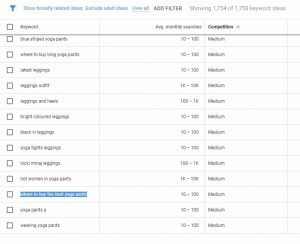— May 29, 2019
I turned the corner coming out of my neighborhood coffee shop and bumped into Eric. It was the second time in two weeks I’d seen the soon-to-be-college-graduate who held a summer internship at my favorite clothing store, MartinPatrick3. He was learning the art of professional selling, his career ambition. He had also hit me up on LinkedIn several times to do a little “coffeeshopping” in advance of day one as an entry-level B2B rep selling software solutions.
When I showed for coffee he was already in a corner booth with a notepad. We shook hands, and when I said “30 minutes, go,” he didn’t hesitate for a second. He had done his homework and knew every detail about my career progression. He was hungry for my best sales advice for someone getting started. He probed, paid close attention, took thorough notes and picked up the bill at the 30-minute mark, respectfully knowing the buzzer had sounded. I knew I had a natural-born sales pro on my hands and told him so. I was envious of his energy and enthusiasm to attack on day one. Eric was all in, and that alone gives him a massive edge.
That’s hardly the case for most new college graduates. In fact, the average American has had more than seven jobs before age 29, and a third of them last less than six months.
Career progression can be a painful slog of trial and error, with missteps and frustration at the prospect of never progressing in the direction of your highest career aspiration.
That’s why I was intrigued to hear about Art Markman’s newest book, “Bring Your Brain to Work,” which mixes his original research on cognitive science with actionable advice for climbing the ladder in the most fulfilling way possible. “It’s the psychology of managing your career,” he says. Whether you’re just entering the workforce or are a veteran who’s facing a crossroads, the book is definitely worth the read.
In addition to writing, Art has a few other jobs. He’s the executive director of IC², a think tank based at the University of Texas that focuses on innovation and entrepreneurship in small towns and rural areas. He also teaches psychology at UT and co-hosts a podcast. But he managed to squeeze in some time to talk to me about how people can have careers that are both successful and meaningful.
Pop the Big Question
Research has shown that millennials value workplaces they believe align with their personal values. According to Art, this is a trait that shouldn’t just be generational. In fact, all of us should be asking the same question: To what degree does your job match your values?
While it may seem like a simple question, the reality is that it truly isn’t. This question isn’t just about whether your job is an opportunity to, say, advance your beliefs; it can even extend to the types of actions you perform at work. “If you’re a sensation-seeking person and you spend every day punching buttons to reach an outcome that’s more or less predetermined, you’re not living your values,” Art says.
Of course, it can be daunting to change jobs — or careers — if you find that your work isn’t aligned with you personally in a way that makes the effort meaningful. But embracing your instinct may prove to be the better option in the long run. “Plenty of people, as they look back on their lives, think quite a bit about the impact that they made on others through the work that they did,” Art says.
It’s solid advice that I’ve experienced firsthand. I took a risk walking away from a secure corporate gig in the middle of the Great Recession. But today I have a career that more closely aligns with my own values. I’ve also found more fulfillment through my work, and — no surprise — that has proved to be the catalyst for more success and the growth of our business.
The 4 Skills Every Worker Needs
In addition to finding work that aligns with your values, Art says there are four skills a worker needs to differentiate themselves from their coworkers:
- Communication. This isn’t just about your ability to converse; it’s about your ability to express yourself — “to find the message that you’re trying to give about what you’d like in your life and to help people to understand that,” he says.
- Productivity. While we all have responsibilities to get things done, make sure that you’re also living up to your responsibility to yourself. Focus on tasks that will help you achieve your long-term goals.
- Effective thinking and learning. Become an expert — on your business, your clients, even your colleagues. “We often don’t value expertise enough in the workplace,” Art says. “You’ve got to know your business back and forth.” So always stay in the learning lane. Ask why things work. Understand as much as you can, and you’ll make yourself invaluable to your colleagues.
- Leadership. This isn’t just about formal authority. Lead by example, but also by sharing your ideas. If you see that a course of action isn’t working for your organization, don’t be scared to speak up. Share your ideas on how to fix it, and demonstrate your value to your organization. Others will follow your lead. Leadership is no longer about title or tenure. Today it’s about talent and earning influence through ideas that have an impact.
Work Is People
Our careers, of course, are individual journeys. We all have different ambitions and different goals for our working lives that evolve with our lives.
But Art reminds us not to forget the people we work with. They’re the shoulders you lean on to help you get things done.
This means not just looking for affirmation; it means finding colleagues you trust — the kind of people “who bring you in sometimes and say, ‘No, don’t do that,’ ” Art says.
I’m fond of the Jim Collins saying “life is people.” So is work. But in many cases it’s not the work we’re doing but rather why we’re doing it and who we’re doing it with that determine our fulfillment.
So, here’s my best advice if you’re considering a career transition: Decide what you want. Align yourself with the right people. Perhaps most importantly, be selective in choosing your boss. That’s right — you have to hire your next manager and make sure that person is the right fit. Someone who will invest in you, guide you, stretch you and help you become the best version of yourself.
“Everything is a partnership,” Art says.
He’s right. Work is people.
Business & Finance Articles on Business 2 Community
(49)
Report Post







